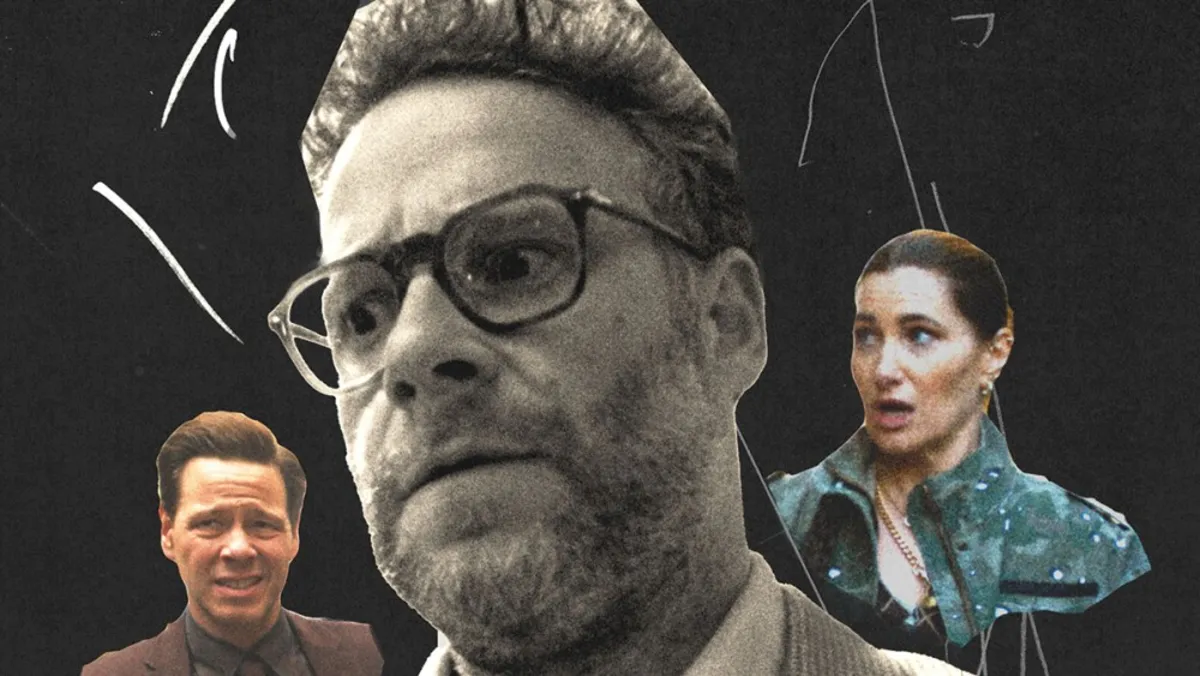
In 2003, shortly after the cult classic “Freaks and Geeks” and before the hit “Superbad,” Seth Rogen found himself in a Hollywood boardroom with his close friend and collaborator, Evan Goldberg. Fresh to Los Angeles and still in their teenage years, they pitched a bold concept: a teen sex comedy set in ancient Rome titled “Gen CCX.” Although the script never saw the light of day, a poignant remark from an executive during that meeting lingered in Rogen's mind for over two decades. “I love movies, but now I have this fear that my job is to ruin them,” the unnamed executive confessed.
Fast forward twenty-two years, and this tragicomic sentiment has inspired Rogen's latest venture, “The Studio,” a sharp-edged satire of the film industry. Set to premiere on Apple TV+ on March 26, the series features Rogen as Matt Remick, the newly appointed head of a film studio. “It was a very humanizing moment, as far as experiences with executives go,” Rogen reflects. Now at 42, Rogen's portrayal of a studio chief illustrates the ongoing conflict between art and commerce in Hollywood.
Co-starring notable talents like Catherine O’Hara, Kathryn Hahn, Ike Barinholtz, and Chase Sui Wonders, “The Studio” combines the self-referential humor of “Entourage” with the rapid-fire wit of “Veep”, all while delivering a critique of the toxic politics, inflated egos, and profit-driven mentality that often plague the entertainment industry.
Rogen’s career trajectory is nothing short of remarkable. Starting as a teenage stand-up comedian in Vancouver, he caught the attention of Judd Apatow and later emerged as a multifaceted talent in Hollywood. He has written, acted, directed, and produced major hits from “Knocked Up” to “Pineapple Express,” while also contributing to critically acclaimed indie films like “50/50” and “The Disaster Artist.” Rogen has also produced award-winning television shows, including “The Boys” and “Pam & Tommy,” and lent his voice to iconic characters like Pumbaa and Donkey Kong.
Inspired by his tumultuous experience at Sony Pictures, particularly after the notorious cyberattack surrounding “The Interview,” Rogen channels his insights into “The Studio.” Featuring cameos from A-list stars such as Zac Efron and Zoë Kravitz, the series is structured uniquely with ten episodes shot in single, continuous takes, showcasing Rogen's most ambitious project to date.
In the opening scenes, Matt Remick inherits a seemingly foolproof project: a movie based on the iconic Kool-Aid brand. The studio's CEO, portrayed by Bryan Cranston, humorously threatens that if rival studios can profit from absurd concepts, they should certainly be able to generate billions from Kool-Aid. As Matt seeks to merge commercial viability with artistic integrity, the introduction of legendary director Martin Scorsese—playing himself—adds a layer of complexity as he pitches a film about Jonestown.
The central conflict revolves around whether Matt can successfully reverse-engineer a blockbuster from Scorsese's pitch without him realizing it was his idea. Unsurprisingly, Matt's attempts lead to a series of spectacular failures, providing a humorous yet biting critique of Hollywood's often absurd realities.
To authentically depict the entertainment industry, Rogen and Goldberg spent months conversing with top-tier industry professionals, including studio heads, agents, and marketing executives. Some discussions took place in formal settings at Point Grey Pictures, the production company they founded in 2011, while others happened in more relaxed atmospheres. Rogen recalls asking many executives whether they viewed themselves as artists and noted that many hesitated but ultimately expressed a desire to see themselves that way.
In “The Studio,” the executives aren't portrayed as mere villains but rather as passionate movie buffs attempting to navigate the treacherous waters of Hollywood. They are primarily motivated by self-preservation, often prioritizing job security over creative integrity. Rogen highlights the consistent tension between ownership and distance when it comes to successful projects versus failures.
The supporting cast includes characters that embody the competitive spirit of Hollywood. Barinholtz plays a rival executive who aligns with Matt after a promotion mishap, while Wonders portrays Matt's ambitious assistant who begins to taste power. Hahn's character is a marketing expert desperate to connect with younger audiences, and O’Hara's role as a former studio head returning to the fold adds depth to the narrative.
The comedic elements of “The Studio” are rooted in Rogen's own frustrations with the industry. The Kool-Aid storyline, for example, draws inspiration from his experience with the maligned adaptation of “The Green Hornet.” Rogen reflects on the constraints faced during that production, revealing how such experiences inform the show's humor and critique of Hollywood's obsession with commercial franchises.
A particularly hilarious episode addresses the casting process, highlighting the absurdity of studio executives grappling with representation issues, such as whether the Kool-Aid Man should be voiced by a Black actor. This satirical commentary on Hollywood’s performative progressivism is a recurring theme throughout the series.
Rogen and Goldberg’s tumultuous relationship with Sony Pictures following the “The Interview” scandal profoundly influenced their creative choices for “The Studio.” Rogen humorously acknowledges that studios today are extremely risk-averse, primarily focusing on projects that guarantee profitability. Despite this, Rogen remains optimistic that innovative projects can still emerge from the industry.
The show’s unique format features long, uninterrupted takes filmed with a single camera, marking a departure from Rogen and Goldberg's typical style. This ambitious choice not only challenged the cast but also elevated the show's visual storytelling. Rogen admits that the pressure of performing without cuts heightened the stakes for everyone involved.
With “The Studio,” Rogen and Goldberg aim to critique Hollywood's current landscape while offering a fresh perspective on the creative process. The series stands as a testament to the possibility of innovative storytelling in an industry often criticized for its lack of originality. As Rogen succinctly puts it, “One movie could completely upend the previous three years of people’s assumptions about what might work.”
With its sharp wit and insightful commentary, “The Studio” is poised to make a significant impact, proving that there is still room for daring and original comedies in Hollywood.